2022年人教版中考英语复习之介词课件(70张ppt)
文档属性
| 名称 | 2022年人教版中考英语复习之介词课件(70张ppt) | 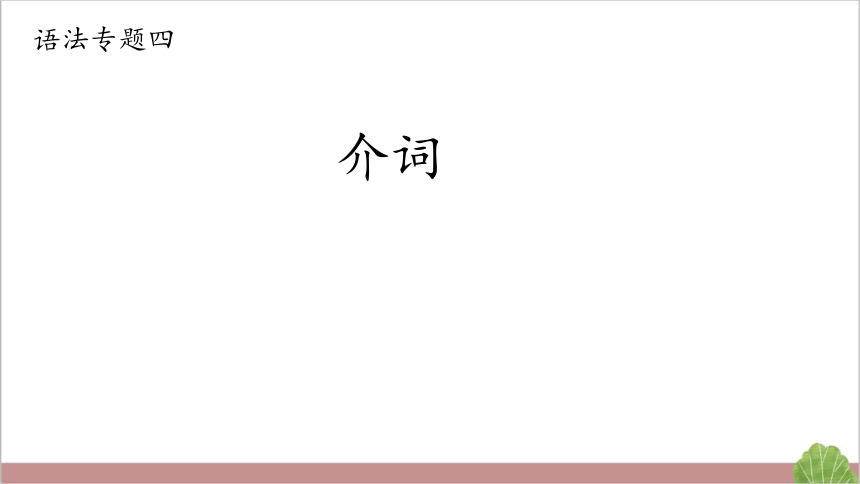 | |
| 格式 | pptx | ||
| 文件大小 | 5.8MB | ||
| 资源类型 | 教案 | ||
| 版本资源 | 通用版 | ||
| 科目 | 英语 | ||
| 更新时间 | 2021-12-30 15:37:25 | ||
图片预览

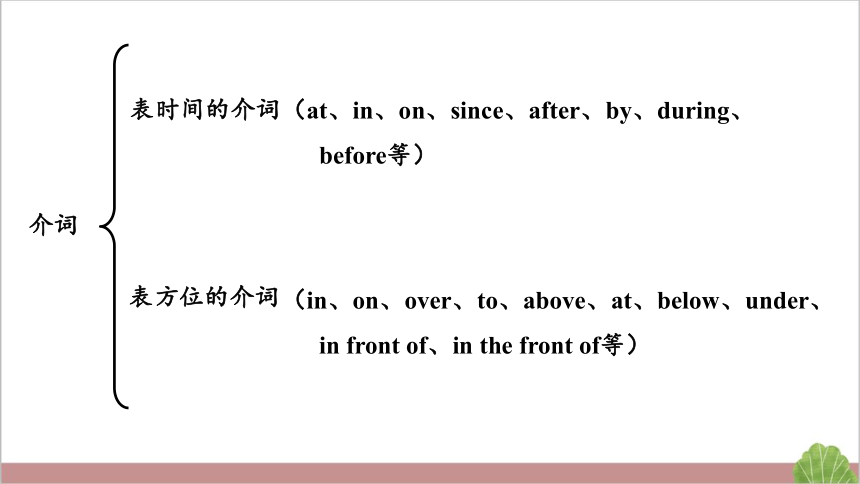
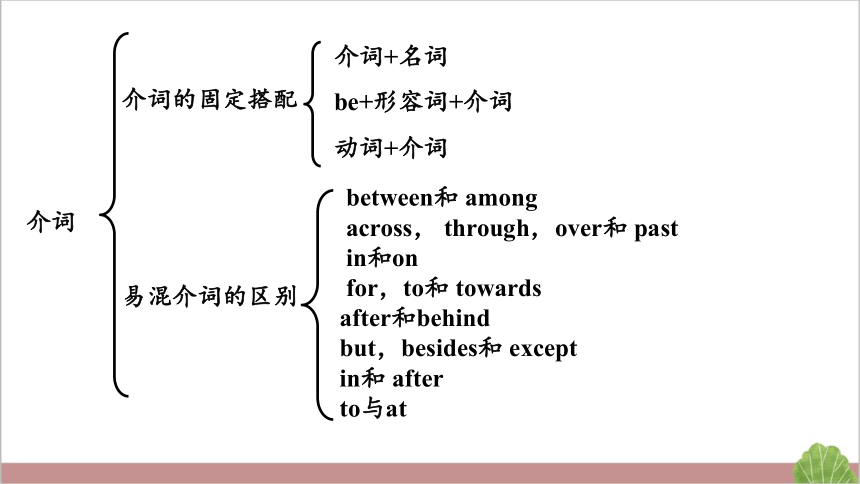
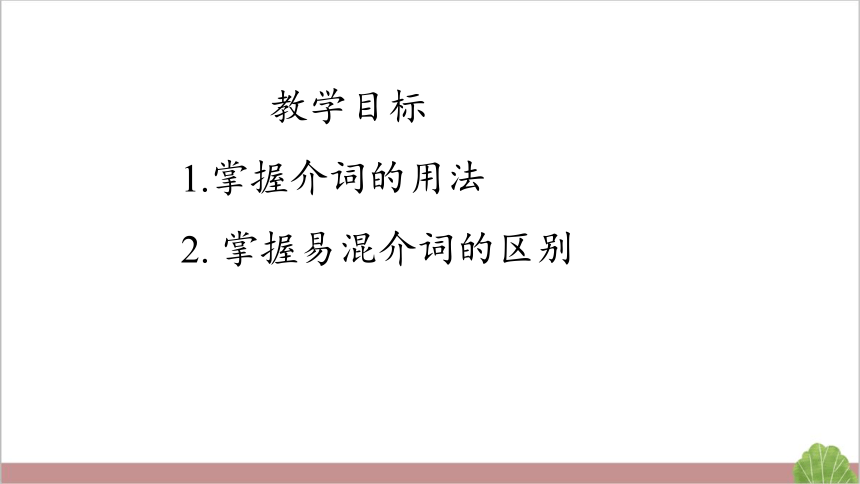
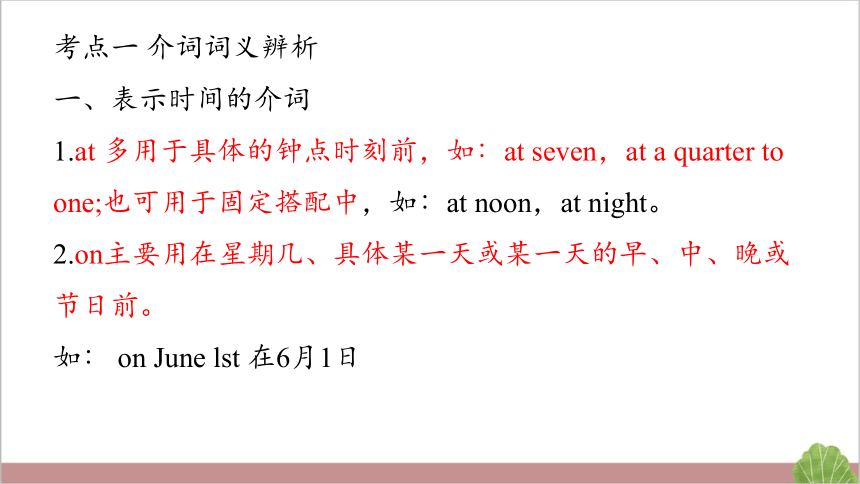
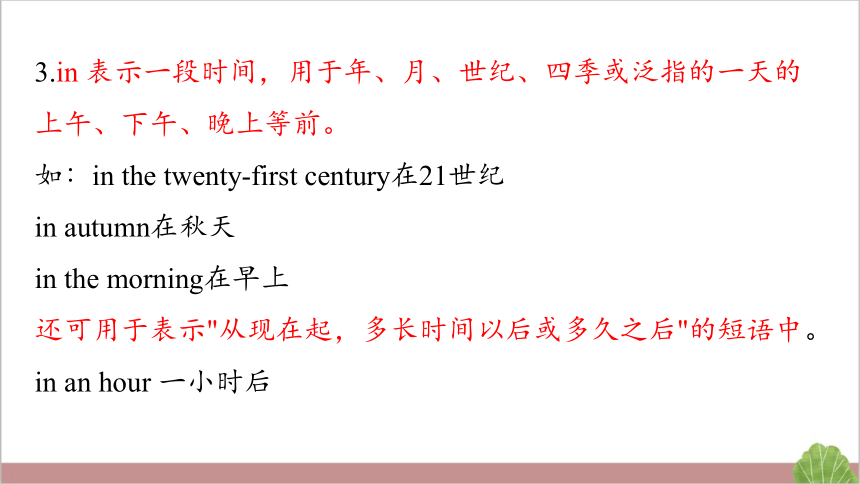
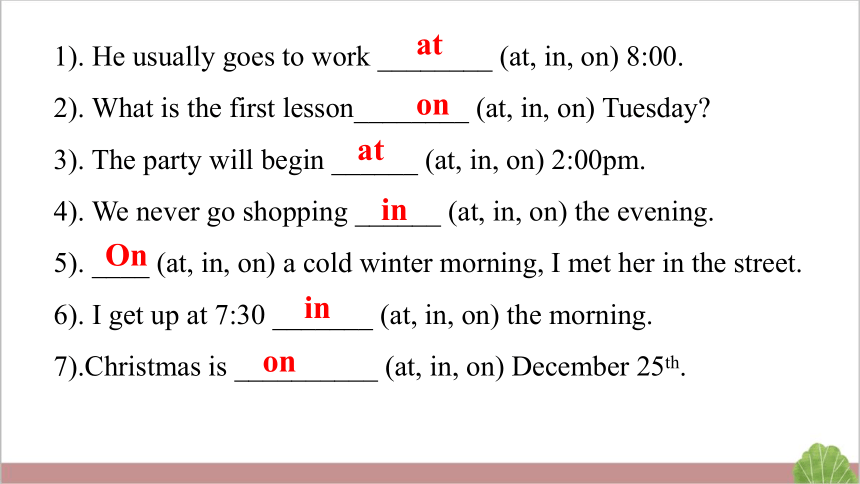
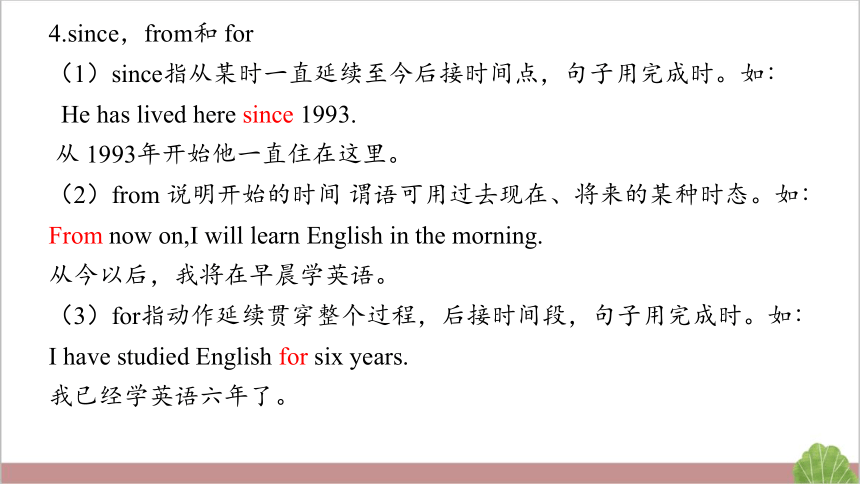
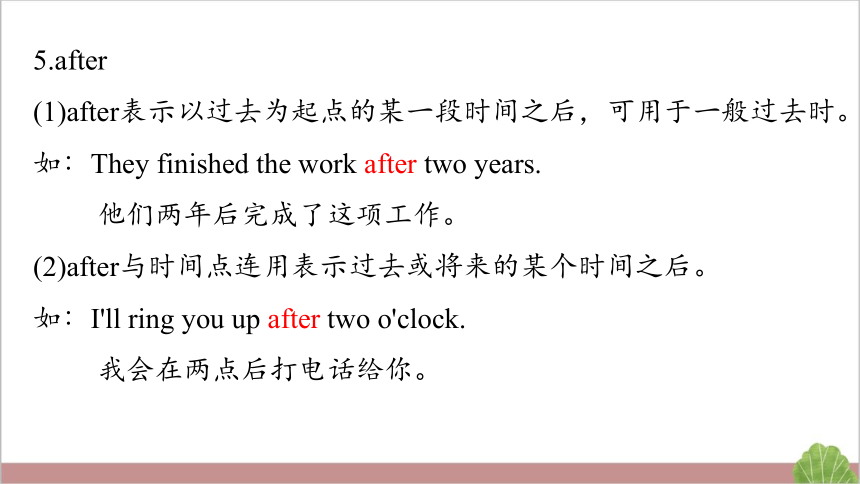
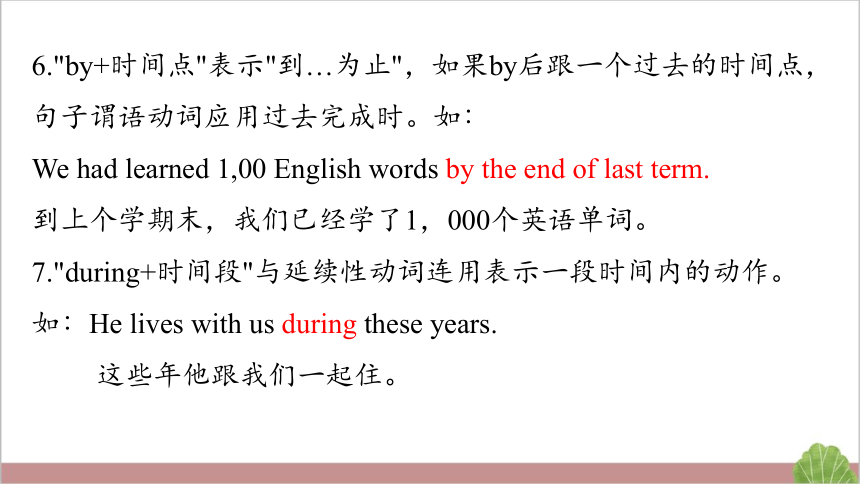
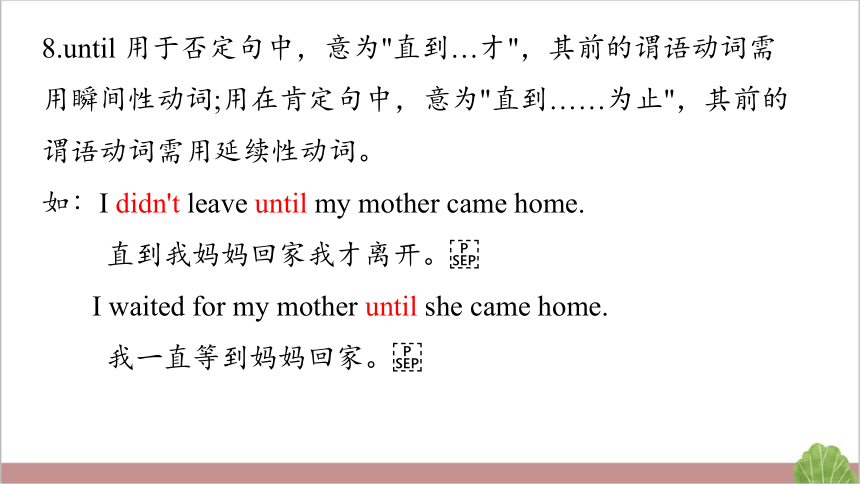
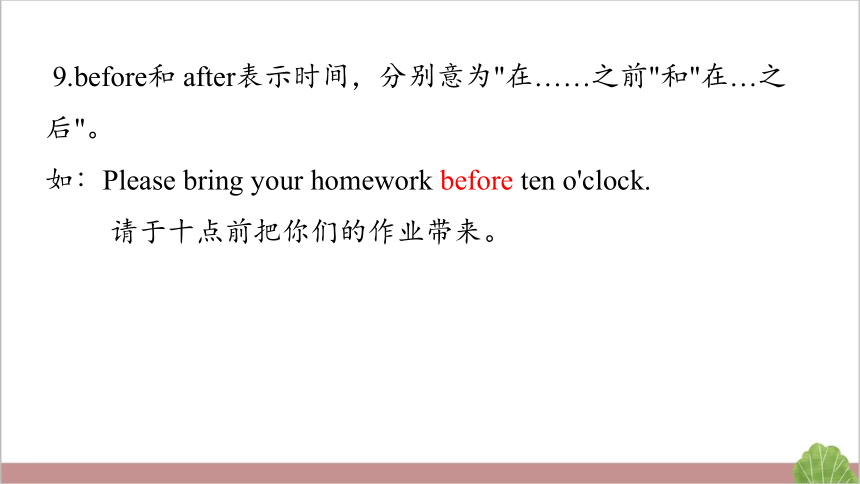
文档简介
(共70张PPT)
介词
语法专题四
介词
(at、in、on、since、after、by、during、
before等)
表时间的介词
表方位的介词
(in、on、over、to、above、at、below、under、
in front of、in the front of等)
介词
between和 among
across, through,over和 past
in和on
for,to和 towards
after和behind
but,besides和 except
in和 after
to与at
介词的固定搭配
易混介词的区别
介词+名词
be+形容词+介词
动词+介词
教学目标
1.掌握介词的用法
2. 掌握易混介词的区别
考点一 介词词义辨析
一、表示时间的介词
1.at 多用于具体的钟点时刻前,如∶at seven,at a quarter to one;也可用于固定搭配中,如∶at noon,at night。
2.on主要用在星期几、具体某一天或某一天的早、中、晚或节日前。
如∶ on June lst 在6月1日
3.in 表示一段时间,用于年、月、世纪、四季或泛指的一天的上午、下午、晚上等前。
如∶in the twenty-first century在21世纪
in autumn在秋天
in the morning在早上
还可用于表示"从现在起,多长时间以后或多久之后"的短语中。
in an hour 一小时后
1). He usually goes to work ________ (at, in, on) 8:00.
2). What is the first lesson________ (at, in, on) Tuesday
3). The party will begin ______ (at, in, on) 2:00pm.
4). We never go shopping ______ (at, in, on) the evening.
5). ____ (at, in, on) a cold winter morning, I met her in the street.
6). I get up at 7:30 _______ (at, in, on) the morning.
7).Christmas is __________ (at, in, on) December 25th.
at
at
on
on
in
in
On
4.since,from和 for
(1)since指从某时一直延续至今后接时间点,句子用完成时。如∶
He has lived here since 1993.
从 1993年开始他一直住在这里。
(2)from 说明开始的时间 谓语可用过去现在、将来的某种时态。如∶
From now on,I will learn English in the morning.
从今以后,我将在早晨学英语。
(3)for指动作延续贯穿整个过程,后接时间段,句子用完成时。如∶
I have studied English for six years.
我已经学英语六年了。
5.after
(1)after表示以过去为起点的某一段时间之后,可用于一般过去时。
如∶They finished the work after two years.
他们两年后完成了这项工作。
(2)after与时间点连用表示过去或将来的某个时间之后。
如∶I'll ring you up after two o'clock.
我会在两点后打电话给你。
6."by+时间点"表示"到…为止",如果by后跟一个过去的时间点,句子谓语动词应用过去完成时。如∶
We had learned 1,00 English words by the end of last term.
到上个学期末,我们已经学了1,000个英语单词。
7."during+时间段"与延续性动词连用表示一段时间内的动作。如∶He lives with us during these years.
这些年他跟我们一起住。
8.until 用于否定句中,意为"直到…才",其前的谓语动词需用瞬间性动词;用在肯定句中,意为"直到……为止",其前的谓语动词需用延续性动词。
如∶I didn't leave until my mother came home.
直到我妈妈回家我才离开。
I waited for my mother until she came home.
我一直等到妈妈回家。
9.before和 after表示时间,分别意为"在……之前"和"在…之后"。
如∶Please bring your homework before ten o'clock.
请于十点前把你们的作业带来。
二、表示方位的介词
1.in, on, to
in表示在某一地区之内的某方位(属于该范围);to 表示在某一地区之外的某方位(不属于该范围);on 表示与某地的毗邻关系。
如∶Fujian is in the southeast of China.
福建省位于中国的东南部。
Hubei is on the north of Hunan.
湖北在湖南的北部。
China is to the west of Japan.
中国位于日本的西部。
2.over,above 和 on
(1)over指在……的正上方,表示垂直在上。
(2)above 泛指在上方,表面不接触。
如∶Raise your arms above your head.
把你的手臂举过你的头。
(3)on指在上面,表示两物体接触。如∶
There is a cat on the jar.
罐子上有一只猫。
3.at,in和 on
(1)at 与较小的地点连用。
如∶at the bus stop,at home
(2)in与较大的地点连用。
如∶in China,in the world
(3)on表示在一个平面上。
如∶on the farm
4.in front of,in the front of和 before
(1)in front of 表示"在……的前面"(范围外)。
如∶There are some trees in front of the classroom.
教室前面有一些树。
(2)in the front of 表示"在…的前部"(范围内)。
如∶There is a blackboard in the front of the classroom.
教室的前面有一块黑板。
(3)before 所表示的位置关系和 in front of 相同,
表示"在…前";"在…前面"。如∶
He sits before me.
他坐在我前面。
5.below和 under
below表示"在….下方或位置低于………",不一定有垂直在下之意;under表示"在……正下方"。如∶
There are many bikes under the trees.
树下有许多自行车。
We are below the sky.
我们在太阳下。
考点二介词的搭配
介词在实际运用中常常和名词、形容词、动词等词类构成固定搭配,这些固定搭配在句子中的表现十分活跃。
1.介词与名词的固定搭配
in a word总而言之 in life一生中
in time 及时 at sea在海上
on time准时,按时 in town在镇里
on foot步行 in English用英语
in a low voice小声地 in the distance在远处
in public当众 in the middle of 在….…中间
in trouble处于困境 in fact事实上
in surprise 惊奇地 in a hurry匆忙,急忙
in the street在街上 by the way顺便说
at the meeting在会上 in the end最后
in space 在太空 by spaceship乘坐宇宙飞船
in order妥当,适宜,正常 on display陈列,展览
during the day在白天 at the foot of在……脚下
in line 成一直线 at the table在桌子旁
on show 展出 day by day日复一日
at school在上学 in silence安静地
at the back of在……后面 in this way用这种方法
out of breath上气不接下气 at the same time 同时
by the time到……的时候 by the end of 到…结束时
in the air在传播中 out of sight消失,看不见
on duty 值日 out of work失业
on top of 除……之外 on the left/right在左/右边
on the other side of在……的另一边
to one's surprise/joy使某人吃惊/高兴的是
on one's way to在某人去….…的路上
by hand手工,亲手交付
2.介词与形容词的固定搭配
careful about 小心 sure about/of肯定
certain of对…有把握 good at擅长
good for 对….有好处 surprised at 对…吃惊
famous for因….而出名 ready for为……做好了准备
known for因………而出名 strict with sb.对某人要求严格
sorry for 对……过意不去 late for 迟到
different from与….不同 successful in在…方面成功
interested in对………感兴趣 disappointed in 对……失望
proud of为……自豪 tired of厌倦
afraid of害怕 short of短缺
full of充满 similar to相似
familiar to 为……所熟悉 satisfied with对………满意
busy with 忙于 friendly to 对……友好
angry with生……的气
3.介词与动词的固定搭配
laugh at 嘲笑 take part in 参加
think of想出 go on with继续
worry about为……担心 look after 照看,照料
look like看起来像 look for寻找
hear from收到…….来信 listen to 听
arrive in到达(大地方) arrive at到达(小地方)
get to 到达 wait for等候
agree with同意,赞同 think about考虑
catch up with赶上.追上 come from 来自
pay for 支付 shout at 对.…叫嚷
talk about谈论 knock at 敲
play with玩耍 point at指向
point to 指出 hear of听说
look forward to 盼望 get on with sb.与某人相处
do well in在…学/做得好 fall behind落后
turn...into 把..变成... help..with..帮助.…...做…...
take/catch hold of 抓住 decide on 决定
take care of 照顾 hand in上交
base on 以...为根据 look at看
keep out of使不进入 leave for离开(去另一个地方)
talk to与……谈话 go in for从事,爱好
have nothing to do with 与…..无关
speak to sb.对某人说 deal with处置,对待
fill with充满,装满 depend on依靠,依赖,取决于
tie..to.把……系在……上 pass on传递
smile at 对…微笑 believe in信任
belong to属于 write to给…写信
regard.…as..把……看作….
题组训练 根据提示,补全所缺的介词
①They will finish the work_____an hour.
一小时后他们将完成这项工作。
②______a warm spring afternoon.
在一个温暖的春天的下午
③He has studied English______2000.
自从 2000年他就开始学英语了。
④Japan is ______the east of China.
日本位于中国的东部。
in
on
since
to
⑤There is a bridge ______the river.
这条河上有一座桥。
⑥0ur teacher usually stands______________the classroom.
我们的老师通常站在教室前面。
⑦Wine is made______grapes.
葡萄酒是用葡萄酿造的。
⑧Clothes are used______keeping us warm.
衣服是用来为我们保暖的。
over
in the front of
from
for
1.in 和 on的区别
on the tree表示枝、叶、果实等长"在树上"
in the tree表示人或其他东西"在树上"
on the wall 表示东西粘贴或挂"在墙上"
in the wall 表示门、窗等嵌"在墙上"
易混易错
2.between和 among 的区别
between 常指"在……(两者)之间";among用于指"在三者或三者以上的人或物)之间"。如∶
Maria sits between Lucy and Lily.
玛丽亚坐在露西和莉莉之间。
Miss Wang stands among her students.
王老师站在她的学生中间。
3.across,through,over和 past的区别
across和through都表示"穿过"。across含有"穿过;横越"之意,指从物体表面穿过或从一遍到另一边;through含有"从中间穿过"之意,着重指从物体内部通过。如∶
The little boy ran across the road.
这个小男孩横穿马路。
The river runs through the city.
这条河从这座城市中间流过。
over多指在空间范围上"穿越;越过",而 past指"经过"。
如∶The plane flew over a line of mountains in the southeast.
飞机从东南方的一座座山上飞过。
He walked past a tall tree.
他从一棵大树旁走过。
4.for,to和 towards的区别
for 常用在leave,start后,表示运动的方向或目的。如∶They'll leave for Beijing to attend a meeting next month.
他们下月将出发去北京参加一个会议。
to 接在go,come,return,move等词之后,表示目的地。如∶When did you return to Guangzhou after the holiday
假期后你何时回广州的
towards意为"朝、向",只说明运动的方向,没有"到达"的意思。如∶They are walking towards the sea.
他们正走向海边。
5.after与behind 的区别
两个词都有"在…后"之意,behind只表示位置方面的之后,不能表示时间,而after常表示时间。
如∶behind the school,after 5 o'clock
6.in,with和by表示"用"时的区别
in主要表示"用语言、声音、原材料等";with表示"用具体有形的东西";by表示"·…手段或方式",后常接动名词。如∶
Can you sing this song in English
你能用英语唱这首歌吗
I write my homework with a pen.
我用钢笔写作业。
The girl made money by selling flowers.
这个女孩通过卖花赚钱。
7.but,besides 和 except的区别
but表示"除……之外",常与含否定意义的词连用;except 表示"除……之外(不再有)",指从整体中排除except所接的人或物,前面常有all,every,any,no等,但在否定句中,except却没有排斥性;beides表示"除……之外(还有)",它的意思是在原来的基础上加上 besides除外的人或物,其前常有other,another,any other,a few 等词。
如∶
We have had nothing but trouble with this car.
我们这辆车净出毛病。
All the students went to the zoo except Jim.
除了吉姆,所有的学生都去动物园了。
I have a few good friends besides you.
除了你之外,我还有几个好朋友。
8.to 和 at表行为对象时的区别
at与某些动词连用,表攻击的目标,含有某种程度的恶意;to 只表示方向,无恶意。如∶
Don't laugh at others.It's impolite.
不要嘲笑别人,那是不礼貌的。
She came to me and shook my hand warmly.
她走到我面前,热情地和我握手。
9.of和 in用于最高级结构中的区别
of后一般接数词或可数名词复数;in后一般是可数名词的单数形式。如∶
Tom is the tallest boy of the four.
汤姆是这四个男孩里最高的那一个。
Tom is the tallest boy in the class.
汤姆是这个班级中最高的男孩。
10.by,in和 on表旅行方式
by∶①不涉及表示交通工具的名词时用by。
如∶by sea,by air;
②涉及表示交通工具的名词,且该名词为单数形式,前面没有冠词或任何修饰语时用by。
如∶by ship,by plane。
on或in∶当旅行方式涉及特定的交通工具时用on或in,交通工
具前应有冠词、形容词性物主代词、指示代词等修饰语。在开
放型或半开放型工具前用on,在封闭型工具前用in。
如∶on my bike
in a car
11.in 与 after的区别
in 表示以此时此刻为起点的将来的一个时间段之后,常与将来时态的谓语动词连用。
注意∶in the past意为"在过去",与一般过去时连用,"in the past/last+时间段"意为"在过去的……中",表示从现在算起的过去的一段时间,包括此时此刻,常与现在完成时连用。
如∶
In the past few years, great changes have taken place in our school.
在过去的几年中,我们学校的变化很大。
"after+时间段"常与一般过去时连用,"after+时间点"常与一般将来时连用。
They finished the work after two years.
他们两年后完成了这项工作。
I'll ring you up after two o'clock.
我会在零点后给你打电话。
12.with与without的区别
with意为"和,对,附带,带有",常用搭配有∶
with the help of..,play with,talk with。
without意为"没有",常用搭配有∶
without saying a word,without breakfast。
13.of sb.与for sb.的区别
of sb.用于It is+adj.+of sb.to do sth.句型中,形容词为clever,kind,nice等描述人物性格特征的词,of后的人物与形容词有主表关系。
如∶
It is kind of you to help me.
你帮助我真好。
for sb.用于It is+adj.+for sb.to do sth.句型中,形容词为easy,important 等不描述人物性格特征的词。for后的人物与形容词没有主表关系。如∶
It is important for us to learn English well.
对我们来说学好英语很重要。
考点一 介词词义辨析
1.Our class are much sure to win the basketball game_____Class Three.
A.of B.in C.against D.from
2.Happy birhday,Peter!Here's a gift_____you.
A.for B.in C.with D.from
3.—How soon will we get the offer from a new high school
—____about two months.
A.In B.For C.Among D.During
C
A
A
4.—Do you agree_____my plan
—Yes,it is wonderful.
A.in B.with C.of
5.Neil Armstrong was the first man to walk on the moon______ 20 July 1969.
A.in B.on C.at D.for
6.Scared by the loud noise,the rabbits ran off______all directions.
A.on B.at C.in D.by
B
B
C
7. Most of the villagers took part in the Dragon Boat races_____
9:00 a.m.____the morning of June 18.
A.at;in B.at;on C.on;in D.on;on
8. —Are you watching the football matches of the World Cup these days
—Sometimes,and I'll watch the match________Janpan and Poland tonight.
A.against B.atbout C.through D.betwee
9. I've ordered some flowers for gandma and they will arrives _____two hours.
A.in B.after C.cover D.for
B
D
A
10. I will give a T-shirt______my brother as a birthday present.
A.by B.to C.from
11. I stopped____the night in a small village while I was on holiday in the Himalayas a few years ago.
A.at B.for C.until D. through
12. More and more people in Qingdao go to work____subway now.
A.with B.on C.in D.by
B
B
D
13.(2018山东潍坊,22)Students here often do physics experiments
_____small groups.
A.by B.in C. for D.at
14.(2018上海,33)Frank is an independent boy.His parents are
proud_____him.
A.on B.to C.in D.of
D
B
考点二介词的搭配
1. In China,we are using the FAST to find stars______. Now more and more people want to know about the largest radio telescope(望远镜)in the world.
A.in person B.in public C.in space
2. Blue whales are______.We should try protcct them.
A.in time B.in public C.in danger
C
C
3. Except for working hard,we should give more attention to proper execise audl enough sleep.______, health always comes first.
A.For example B.After all C.So far
4.—What are you doing
—I'm looking______the kids.They should be back for lunch now.
A. after B.at C.for D.up
B
C
B 组 考点一 介词词义辨析
1. More and more young people go skating_____winter.
A.at B.in C.on D.to
2. We won! The honor belongs_____all the members of our team.
A.by B.of C.at D.to
3. Shirley is still waiting for her flight to New York City_____the airport.
A.at B.under C.on D.with
B
D
A
4. _____May 5th,2017,the C919 took of sucessfully for the first time at Shanghai Pudong International Airport.
A.On B.In C.At D.Of
5. Father brought his little boy to a concert. But he was too young to sit________the whole concert.
A.for B.with C.during D.through
6. China successfully hosted the Belt and Road Forum____May,2017.
A.on B.in C.by
A
D
B
7. It's so cold outside. Remember to close the door_____you when you leave.
A.beside B.before C.with D.behind
8. Class,let's see who can spell the most words_____these letters.
A.at B.into C.on D. with
9. It's a good idea to send the old books______the children who need them.
A.at B.of C.to D.by
D
D
C
10. —Have you got the answer____ the question
A.on B.with C.about D.to
11. Don't stay inside _____such a sunny morning. Let's go out to enjoy the gentle wind and the sweet flowers.
A.on B.in C.from
12. Ma Yun,the Chairperson of Alibaba Group,has made much money______the Internet.
A.through B.along C.across D.towards
D
A
A
13. The Dragon Boat Festival this year will come______four days.
A. after B.for C.during D.in
14. Cambridge is a small city______ the east of England.
A.between B.with C.in D.under
15. —This problem is far_____ me;I'm afraid I can't work it out.
—Don't worry;we will help you.
A.beyond B.beside C.behind D.between
D
C
A
考点二 介词的搭配
1. When you'e invited to have dinner at home by an American friend, you should be_____or a little later. It's different from our Chinese custom.
A.on time B.on business C.on show
2. MissLi,_____is active all the time.Although she has not been well these days, her class is still full of laughter.
A.as you know B.all in all C.to start with
3. I can't see Lucy because she is ____ the tree.
A.in front of B.behind C.next to
A
A
B
4. Grace often gets nervous before she gives a speech_____.
A.in publie B.in total C.in common
5. —How was your life in England
—Quite diferent from here.______,people there drink tea with milk.
A.In my opinion B.To my surprise C.At the beginning
6. You'd beter not ride_____with your friends in the street. It's dangerous.
A.side by side B.as a result
C.as well as D.by the way
A
B
A
7. Many wild animals are______,and it's time for us to do whatever we
can to protect them.
A.on duty B.on show C.in order D.in danger
8. —Sally is my best friend.She is always there whenever I'm_____.
—Yeah.A friend in need is a friend indeed.
A.in order B.in trouble C.in public
9. I want to know what happened_____my friend. I haven't heard___her recently.
A.on;of B.to;from C.to;of D.on;from
D
B
B
10. —Xian Jie is a good friend indeed.He is always there whenever I am_____.
—I think so.He is just like the cute Baymax(大白).
A.in trouble B.in style C.in order
11. —_____my surprise,Jin Ming was chosen into our school football team.
—Congratulations.He did well ____playing football when he was very young.I hope he will be the best player in our school.
A. To;of B.At;at C.To;in D.In;about
A
C
12. Jim sits behind me,so I sit______him.
A.at the top of B. at the end C.in the middle of D.in front of
13. Everyone wants to win.But_____me,the most important thing is to learn something new and have fun.
A.as for B.thanks to C.instead of D. such as
14. —The ship sinking of Korea teaches us to care for ourselves and the people around us.
—So it is._____,life is the most important to everyone.
A.For example B.At last C. After all
D
A
C
介词
语法专题四
介词
(at、in、on、since、after、by、during、
before等)
表时间的介词
表方位的介词
(in、on、over、to、above、at、below、under、
in front of、in the front of等)
介词
between和 among
across, through,over和 past
in和on
for,to和 towards
after和behind
but,besides和 except
in和 after
to与at
介词的固定搭配
易混介词的区别
介词+名词
be+形容词+介词
动词+介词
教学目标
1.掌握介词的用法
2. 掌握易混介词的区别
考点一 介词词义辨析
一、表示时间的介词
1.at 多用于具体的钟点时刻前,如∶at seven,at a quarter to one;也可用于固定搭配中,如∶at noon,at night。
2.on主要用在星期几、具体某一天或某一天的早、中、晚或节日前。
如∶ on June lst 在6月1日
3.in 表示一段时间,用于年、月、世纪、四季或泛指的一天的上午、下午、晚上等前。
如∶in the twenty-first century在21世纪
in autumn在秋天
in the morning在早上
还可用于表示"从现在起,多长时间以后或多久之后"的短语中。
in an hour 一小时后
1). He usually goes to work ________ (at, in, on) 8:00.
2). What is the first lesson________ (at, in, on) Tuesday
3). The party will begin ______ (at, in, on) 2:00pm.
4). We never go shopping ______ (at, in, on) the evening.
5). ____ (at, in, on) a cold winter morning, I met her in the street.
6). I get up at 7:30 _______ (at, in, on) the morning.
7).Christmas is __________ (at, in, on) December 25th.
at
at
on
on
in
in
On
4.since,from和 for
(1)since指从某时一直延续至今后接时间点,句子用完成时。如∶
He has lived here since 1993.
从 1993年开始他一直住在这里。
(2)from 说明开始的时间 谓语可用过去现在、将来的某种时态。如∶
From now on,I will learn English in the morning.
从今以后,我将在早晨学英语。
(3)for指动作延续贯穿整个过程,后接时间段,句子用完成时。如∶
I have studied English for six years.
我已经学英语六年了。
5.after
(1)after表示以过去为起点的某一段时间之后,可用于一般过去时。
如∶They finished the work after two years.
他们两年后完成了这项工作。
(2)after与时间点连用表示过去或将来的某个时间之后。
如∶I'll ring you up after two o'clock.
我会在两点后打电话给你。
6."by+时间点"表示"到…为止",如果by后跟一个过去的时间点,句子谓语动词应用过去完成时。如∶
We had learned 1,00 English words by the end of last term.
到上个学期末,我们已经学了1,000个英语单词。
7."during+时间段"与延续性动词连用表示一段时间内的动作。如∶He lives with us during these years.
这些年他跟我们一起住。
8.until 用于否定句中,意为"直到…才",其前的谓语动词需用瞬间性动词;用在肯定句中,意为"直到……为止",其前的谓语动词需用延续性动词。
如∶I didn't leave until my mother came home.
直到我妈妈回家我才离开。
I waited for my mother until she came home.
我一直等到妈妈回家。
9.before和 after表示时间,分别意为"在……之前"和"在…之后"。
如∶Please bring your homework before ten o'clock.
请于十点前把你们的作业带来。
二、表示方位的介词
1.in, on, to
in表示在某一地区之内的某方位(属于该范围);to 表示在某一地区之外的某方位(不属于该范围);on 表示与某地的毗邻关系。
如∶Fujian is in the southeast of China.
福建省位于中国的东南部。
Hubei is on the north of Hunan.
湖北在湖南的北部。
China is to the west of Japan.
中国位于日本的西部。
2.over,above 和 on
(1)over指在……的正上方,表示垂直在上。
(2)above 泛指在上方,表面不接触。
如∶Raise your arms above your head.
把你的手臂举过你的头。
(3)on指在上面,表示两物体接触。如∶
There is a cat on the jar.
罐子上有一只猫。
3.at,in和 on
(1)at 与较小的地点连用。
如∶at the bus stop,at home
(2)in与较大的地点连用。
如∶in China,in the world
(3)on表示在一个平面上。
如∶on the farm
4.in front of,in the front of和 before
(1)in front of 表示"在……的前面"(范围外)。
如∶There are some trees in front of the classroom.
教室前面有一些树。
(2)in the front of 表示"在…的前部"(范围内)。
如∶There is a blackboard in the front of the classroom.
教室的前面有一块黑板。
(3)before 所表示的位置关系和 in front of 相同,
表示"在…前";"在…前面"。如∶
He sits before me.
他坐在我前面。
5.below和 under
below表示"在….下方或位置低于………",不一定有垂直在下之意;under表示"在……正下方"。如∶
There are many bikes under the trees.
树下有许多自行车。
We are below the sky.
我们在太阳下。
考点二介词的搭配
介词在实际运用中常常和名词、形容词、动词等词类构成固定搭配,这些固定搭配在句子中的表现十分活跃。
1.介词与名词的固定搭配
in a word总而言之 in life一生中
in time 及时 at sea在海上
on time准时,按时 in town在镇里
on foot步行 in English用英语
in a low voice小声地 in the distance在远处
in public当众 in the middle of 在….…中间
in trouble处于困境 in fact事实上
in surprise 惊奇地 in a hurry匆忙,急忙
in the street在街上 by the way顺便说
at the meeting在会上 in the end最后
in space 在太空 by spaceship乘坐宇宙飞船
in order妥当,适宜,正常 on display陈列,展览
during the day在白天 at the foot of在……脚下
in line 成一直线 at the table在桌子旁
on show 展出 day by day日复一日
at school在上学 in silence安静地
at the back of在……后面 in this way用这种方法
out of breath上气不接下气 at the same time 同时
by the time到……的时候 by the end of 到…结束时
in the air在传播中 out of sight消失,看不见
on duty 值日 out of work失业
on top of 除……之外 on the left/right在左/右边
on the other side of在……的另一边
to one's surprise/joy使某人吃惊/高兴的是
on one's way to在某人去….…的路上
by hand手工,亲手交付
2.介词与形容词的固定搭配
careful about 小心 sure about/of肯定
certain of对…有把握 good at擅长
good for 对….有好处 surprised at 对…吃惊
famous for因….而出名 ready for为……做好了准备
known for因………而出名 strict with sb.对某人要求严格
sorry for 对……过意不去 late for 迟到
different from与….不同 successful in在…方面成功
interested in对………感兴趣 disappointed in 对……失望
proud of为……自豪 tired of厌倦
afraid of害怕 short of短缺
full of充满 similar to相似
familiar to 为……所熟悉 satisfied with对………满意
busy with 忙于 friendly to 对……友好
angry with生……的气
3.介词与动词的固定搭配
laugh at 嘲笑 take part in 参加
think of想出 go on with继续
worry about为……担心 look after 照看,照料
look like看起来像 look for寻找
hear from收到…….来信 listen to 听
arrive in到达(大地方) arrive at到达(小地方)
get to 到达 wait for等候
agree with同意,赞同 think about考虑
catch up with赶上.追上 come from 来自
pay for 支付 shout at 对.…叫嚷
talk about谈论 knock at 敲
play with玩耍 point at指向
point to 指出 hear of听说
look forward to 盼望 get on with sb.与某人相处
do well in在…学/做得好 fall behind落后
turn...into 把..变成... help..with..帮助.…...做…...
take/catch hold of 抓住 decide on 决定
take care of 照顾 hand in上交
base on 以...为根据 look at看
keep out of使不进入 leave for离开(去另一个地方)
talk to与……谈话 go in for从事,爱好
have nothing to do with 与…..无关
speak to sb.对某人说 deal with处置,对待
fill with充满,装满 depend on依靠,依赖,取决于
tie..to.把……系在……上 pass on传递
smile at 对…微笑 believe in信任
belong to属于 write to给…写信
regard.…as..把……看作….
题组训练 根据提示,补全所缺的介词
①They will finish the work_____an hour.
一小时后他们将完成这项工作。
②______a warm spring afternoon.
在一个温暖的春天的下午
③He has studied English______2000.
自从 2000年他就开始学英语了。
④Japan is ______the east of China.
日本位于中国的东部。
in
on
since
to
⑤There is a bridge ______the river.
这条河上有一座桥。
⑥0ur teacher usually stands______________the classroom.
我们的老师通常站在教室前面。
⑦Wine is made______grapes.
葡萄酒是用葡萄酿造的。
⑧Clothes are used______keeping us warm.
衣服是用来为我们保暖的。
over
in the front of
from
for
1.in 和 on的区别
on the tree表示枝、叶、果实等长"在树上"
in the tree表示人或其他东西"在树上"
on the wall 表示东西粘贴或挂"在墙上"
in the wall 表示门、窗等嵌"在墙上"
易混易错
2.between和 among 的区别
between 常指"在……(两者)之间";among用于指"在三者或三者以上的人或物)之间"。如∶
Maria sits between Lucy and Lily.
玛丽亚坐在露西和莉莉之间。
Miss Wang stands among her students.
王老师站在她的学生中间。
3.across,through,over和 past的区别
across和through都表示"穿过"。across含有"穿过;横越"之意,指从物体表面穿过或从一遍到另一边;through含有"从中间穿过"之意,着重指从物体内部通过。如∶
The little boy ran across the road.
这个小男孩横穿马路。
The river runs through the city.
这条河从这座城市中间流过。
over多指在空间范围上"穿越;越过",而 past指"经过"。
如∶The plane flew over a line of mountains in the southeast.
飞机从东南方的一座座山上飞过。
He walked past a tall tree.
他从一棵大树旁走过。
4.for,to和 towards的区别
for 常用在leave,start后,表示运动的方向或目的。如∶They'll leave for Beijing to attend a meeting next month.
他们下月将出发去北京参加一个会议。
to 接在go,come,return,move等词之后,表示目的地。如∶When did you return to Guangzhou after the holiday
假期后你何时回广州的
towards意为"朝、向",只说明运动的方向,没有"到达"的意思。如∶They are walking towards the sea.
他们正走向海边。
5.after与behind 的区别
两个词都有"在…后"之意,behind只表示位置方面的之后,不能表示时间,而after常表示时间。
如∶behind the school,after 5 o'clock
6.in,with和by表示"用"时的区别
in主要表示"用语言、声音、原材料等";with表示"用具体有形的东西";by表示"·…手段或方式",后常接动名词。如∶
Can you sing this song in English
你能用英语唱这首歌吗
I write my homework with a pen.
我用钢笔写作业。
The girl made money by selling flowers.
这个女孩通过卖花赚钱。
7.but,besides 和 except的区别
but表示"除……之外",常与含否定意义的词连用;except 表示"除……之外(不再有)",指从整体中排除except所接的人或物,前面常有all,every,any,no等,但在否定句中,except却没有排斥性;beides表示"除……之外(还有)",它的意思是在原来的基础上加上 besides除外的人或物,其前常有other,another,any other,a few 等词。
如∶
We have had nothing but trouble with this car.
我们这辆车净出毛病。
All the students went to the zoo except Jim.
除了吉姆,所有的学生都去动物园了。
I have a few good friends besides you.
除了你之外,我还有几个好朋友。
8.to 和 at表行为对象时的区别
at与某些动词连用,表攻击的目标,含有某种程度的恶意;to 只表示方向,无恶意。如∶
Don't laugh at others.It's impolite.
不要嘲笑别人,那是不礼貌的。
She came to me and shook my hand warmly.
她走到我面前,热情地和我握手。
9.of和 in用于最高级结构中的区别
of后一般接数词或可数名词复数;in后一般是可数名词的单数形式。如∶
Tom is the tallest boy of the four.
汤姆是这四个男孩里最高的那一个。
Tom is the tallest boy in the class.
汤姆是这个班级中最高的男孩。
10.by,in和 on表旅行方式
by∶①不涉及表示交通工具的名词时用by。
如∶by sea,by air;
②涉及表示交通工具的名词,且该名词为单数形式,前面没有冠词或任何修饰语时用by。
如∶by ship,by plane。
on或in∶当旅行方式涉及特定的交通工具时用on或in,交通工
具前应有冠词、形容词性物主代词、指示代词等修饰语。在开
放型或半开放型工具前用on,在封闭型工具前用in。
如∶on my bike
in a car
11.in 与 after的区别
in 表示以此时此刻为起点的将来的一个时间段之后,常与将来时态的谓语动词连用。
注意∶in the past意为"在过去",与一般过去时连用,"in the past/last+时间段"意为"在过去的……中",表示从现在算起的过去的一段时间,包括此时此刻,常与现在完成时连用。
如∶
In the past few years, great changes have taken place in our school.
在过去的几年中,我们学校的变化很大。
"after+时间段"常与一般过去时连用,"after+时间点"常与一般将来时连用。
They finished the work after two years.
他们两年后完成了这项工作。
I'll ring you up after two o'clock.
我会在零点后给你打电话。
12.with与without的区别
with意为"和,对,附带,带有",常用搭配有∶
with the help of..,play with,talk with。
without意为"没有",常用搭配有∶
without saying a word,without breakfast。
13.of sb.与for sb.的区别
of sb.用于It is+adj.+of sb.to do sth.句型中,形容词为clever,kind,nice等描述人物性格特征的词,of后的人物与形容词有主表关系。
如∶
It is kind of you to help me.
你帮助我真好。
for sb.用于It is+adj.+for sb.to do sth.句型中,形容词为easy,important 等不描述人物性格特征的词。for后的人物与形容词没有主表关系。如∶
It is important for us to learn English well.
对我们来说学好英语很重要。
考点一 介词词义辨析
1.Our class are much sure to win the basketball game_____Class Three.
A.of B.in C.against D.from
2.Happy birhday,Peter!Here's a gift_____you.
A.for B.in C.with D.from
3.—How soon will we get the offer from a new high school
—____about two months.
A.In B.For C.Among D.During
C
A
A
4.—Do you agree_____my plan
—Yes,it is wonderful.
A.in B.with C.of
5.Neil Armstrong was the first man to walk on the moon______ 20 July 1969.
A.in B.on C.at D.for
6.Scared by the loud noise,the rabbits ran off______all directions.
A.on B.at C.in D.by
B
B
C
7. Most of the villagers took part in the Dragon Boat races_____
9:00 a.m.____the morning of June 18.
A.at;in B.at;on C.on;in D.on;on
8. —Are you watching the football matches of the World Cup these days
—Sometimes,and I'll watch the match________Janpan and Poland tonight.
A.against B.atbout C.through D.betwee
9. I've ordered some flowers for gandma and they will arrives _____two hours.
A.in B.after C.cover D.for
B
D
A
10. I will give a T-shirt______my brother as a birthday present.
A.by B.to C.from
11. I stopped____the night in a small village while I was on holiday in the Himalayas a few years ago.
A.at B.for C.until D. through
12. More and more people in Qingdao go to work____subway now.
A.with B.on C.in D.by
B
B
D
13.(2018山东潍坊,22)Students here often do physics experiments
_____small groups.
A.by B.in C. for D.at
14.(2018上海,33)Frank is an independent boy.His parents are
proud_____him.
A.on B.to C.in D.of
D
B
考点二介词的搭配
1. In China,we are using the FAST to find stars______. Now more and more people want to know about the largest radio telescope(望远镜)in the world.
A.in person B.in public C.in space
2. Blue whales are______.We should try protcct them.
A.in time B.in public C.in danger
C
C
3. Except for working hard,we should give more attention to proper execise audl enough sleep.______, health always comes first.
A.For example B.After all C.So far
4.—What are you doing
—I'm looking______the kids.They should be back for lunch now.
A. after B.at C.for D.up
B
C
B 组 考点一 介词词义辨析
1. More and more young people go skating_____winter.
A.at B.in C.on D.to
2. We won! The honor belongs_____all the members of our team.
A.by B.of C.at D.to
3. Shirley is still waiting for her flight to New York City_____the airport.
A.at B.under C.on D.with
B
D
A
4. _____May 5th,2017,the C919 took of sucessfully for the first time at Shanghai Pudong International Airport.
A.On B.In C.At D.Of
5. Father brought his little boy to a concert. But he was too young to sit________the whole concert.
A.for B.with C.during D.through
6. China successfully hosted the Belt and Road Forum____May,2017.
A.on B.in C.by
A
D
B
7. It's so cold outside. Remember to close the door_____you when you leave.
A.beside B.before C.with D.behind
8. Class,let's see who can spell the most words_____these letters.
A.at B.into C.on D. with
9. It's a good idea to send the old books______the children who need them.
A.at B.of C.to D.by
D
D
C
10. —Have you got the answer____ the question
A.on B.with C.about D.to
11. Don't stay inside _____such a sunny morning. Let's go out to enjoy the gentle wind and the sweet flowers.
A.on B.in C.from
12. Ma Yun,the Chairperson of Alibaba Group,has made much money______the Internet.
A.through B.along C.across D.towards
D
A
A
13. The Dragon Boat Festival this year will come______four days.
A. after B.for C.during D.in
14. Cambridge is a small city______ the east of England.
A.between B.with C.in D.under
15. —This problem is far_____ me;I'm afraid I can't work it out.
—Don't worry;we will help you.
A.beyond B.beside C.behind D.between
D
C
A
考点二 介词的搭配
1. When you'e invited to have dinner at home by an American friend, you should be_____or a little later. It's different from our Chinese custom.
A.on time B.on business C.on show
2. MissLi,_____is active all the time.Although she has not been well these days, her class is still full of laughter.
A.as you know B.all in all C.to start with
3. I can't see Lucy because she is ____ the tree.
A.in front of B.behind C.next to
A
A
B
4. Grace often gets nervous before she gives a speech_____.
A.in publie B.in total C.in common
5. —How was your life in England
—Quite diferent from here.______,people there drink tea with milk.
A.In my opinion B.To my surprise C.At the beginning
6. You'd beter not ride_____with your friends in the street. It's dangerous.
A.side by side B.as a result
C.as well as D.by the way
A
B
A
7. Many wild animals are______,and it's time for us to do whatever we
can to protect them.
A.on duty B.on show C.in order D.in danger
8. —Sally is my best friend.She is always there whenever I'm_____.
—Yeah.A friend in need is a friend indeed.
A.in order B.in trouble C.in public
9. I want to know what happened_____my friend. I haven't heard___her recently.
A.on;of B.to;from C.to;of D.on;from
D
B
B
10. —Xian Jie is a good friend indeed.He is always there whenever I am_____.
—I think so.He is just like the cute Baymax(大白).
A.in trouble B.in style C.in order
11. —_____my surprise,Jin Ming was chosen into our school football team.
—Congratulations.He did well ____playing football when he was very young.I hope he will be the best player in our school.
A. To;of B.At;at C.To;in D.In;about
A
C
12. Jim sits behind me,so I sit______him.
A.at the top of B. at the end C.in the middle of D.in front of
13. Everyone wants to win.But_____me,the most important thing is to learn something new and have fun.
A.as for B.thanks to C.instead of D. such as
14. —The ship sinking of Korea teaches us to care for ourselves and the people around us.
—So it is._____,life is the most important to everyone.
A.For example B.At last C. After all
D
A
C
同课章节目录
- 词法
- 名词
- 动词和动词短语
- 动词语态
- 动词时态
- 助动词和情态动词
- 非谓语动词
- 冠词
- 代词
- 数词和量词
- 形容词副词及其比较等级
- 介词和介词短语
- 连词和感叹词
- 构词法
- 相似、相近词比较
- 句法
- 陈述句
- 一般疑问句和否定疑问句
- 特殊疑问句及选择疑问句
- 反意疑问句
- 存在句(There be句型)
- 宾语从句
- 定语从句
- 状语从句
- 主谓一致问题
- 简单句
- 并列句
- 复合句
- 主谓一致
- 主、表语从句
- 名词性从句
- 直接引语和间接引语
- 虚拟语气
- 感叹句
- 强调句
- 倒装句
- 祈使句
- 句子的成分
- 句子的分类
- 题型专区
- 单项选择部分
- 易错题
- 完形填空
- 阅读理解
- 词汇练习
- 听说训练
- 句型转换
- 补全对话
- 短文改错
- 翻译
- 书面表达
- 任务型阅读
- 语法填空
- 其他资料
